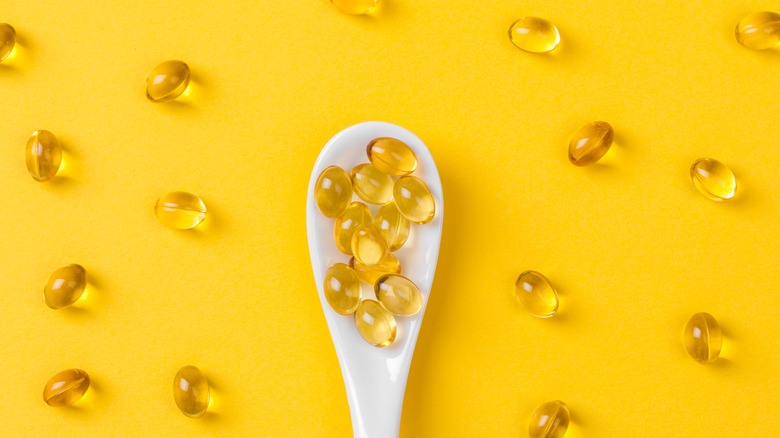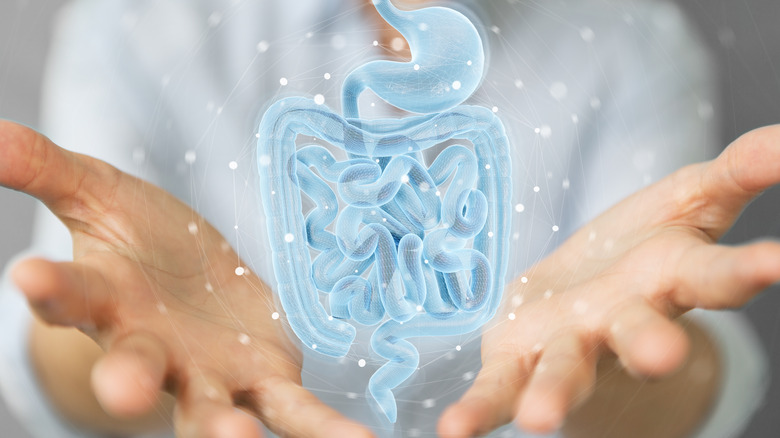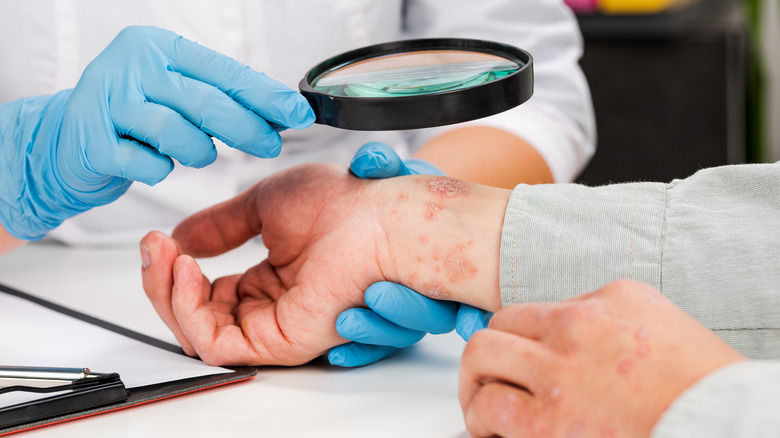You're Not Getting Enough Vitamin E If This Happens To You
Vitamin E is one of the four fat-soluble vitamins along with vitamins A, D, and K — meaning that they rely on dietary fats to be absorbed, according to the National Institutes of Health (NIH). While you might have seen vitamin E in cosmetics and beauty products, your body needs it for much more than just healthy and glowing skin. Vitamin E is involved in heart and nerve health, immune function and gene expression — thanks to its potent antioxidant properties, it is even needed for the prevention of inflammation-related chronic diseases such as cancer (via Harvard School of Public Health).
The NIH explains that vitamin E is actually a group of eight chemical compounds divided into alpha-, beta-, gamma-, and delta-tocopherols and tocotrienols. However, out of all of them, alpha-tocopherol is the only one fit to meet the human body's vitamin needs. Fortunately, vitamin E is a naturally occurring vitamin present in numerous foods, from nuts and seeds to vegetable oils, avocado, mango, asparagus, fortified cereals, and green leafy vegetables like spinach and collard greens.
According to the Food and Drug Administration (FDA), the recommended amount of vitamin E healthy adults should consume per day (also known as the daily value or DV) is 15 milligrams alpha-tocopherol. Yet, because it is present in so many foods, it is easy to consume through diet. Otherwise, you could also get vitamin E via dietary supplements.
Causes of vitamin E deficiency
Since vitamin E is present in such a wide range of natural food sources, the National Institutes of Health (NIH) states that its deficiency is rare in healthy people. Nevertheless, a 2014 study published in Advances in Nutrition explains that about 90% of Americans don't get enough of this vitamin through their diet, which could increase the risk of deficiency, especially in children. Per the study, the leading causes of vitamin E deficiency are due to "genetic defects" and "fat-malabsorption syndromes."
On the one hand, genetic defects are characterized by a flaw in the protein in charge of transporting the vitamin to the liver, where it would get stored with the other fat-soluble vitamins (A, D, and K). However, since the vitamin wouldn't even reach the liver, the study explains that this genetic defect leads to a rapid decrease in vitamin E levels. And on the other hand, as its name implies, fat-malabsorption syndromes prevent your body from absorbing dietary fats, which are needed to take the vitamin in (per the NIH). Some common fat-malabsorption disorders include Crohn's, celiac, or liver diseases, ulcerative colitis, cholestasis or obstructed bile secretion, pancreatitis, and gastric surgery (via the National Library of Medicine).
You lose control of bodily movements
According to a 2015 study published in the Journal of Movement Disorders, vitamin E is essential for the maintenance of normal brain and nerve structure and function. Therefore, its deficiency often leads to neuropathy or nerve dysfunction. Since your nerves are in charge of muscle contraction, people with vitamin E deficiency often show symptoms of ataxia.
Ataxia is a condition characterized by poor muscle control, which results in the loss or difficulty performing basic bodily movements like walking, talking, or swallowing (via the Mayo Clinic). Additional symptoms of ataxia include clumsiness of the hands, loss of proprioception (the perceived position and movement of different body parts), absence of bodily reflexes, difficulty performing quick movements, poor balance, and impaired vision. If left untreated, it may even lead to wheelchair dependence due to leg weakness, according to the National Library of Medicine. Nevertheless, the Mayo Clinic explains that ataxia caused by vitamin deficiency may be reversed once you start a supplementation treatment.
Your brain health starts to deteriorate
According to a 2021 review published in the Journal of Clinical and Translational Research, vitamin E is a powerful antioxidant, meaning that it scavenges harmful molecules called free radicals, which, in excess, cause oxidative stress — an inflammatory process that damages your cells and tissues (via Healthline). Per the review, your brain and central nervous system are especially vulnerable to oxidative damage, and therefore, vitamin E's role in protecting them is vital.
In addition, the review explains that oxidative stress is directly related to how your brain works, as well as being a distinctive feature of Alzheimer's Disease. Thus, vitamin E deficiency has been associated with brain health deterioration — although its supplementation may help reduce the damage. Moreover, Alzheimer's Disease is characterized by the accumulation of a toxic compound called amyloid-beta peptide in your brain.
According to the review, research suggests that, aside from protecting your brain from oxidative damage, vitamin E may play an important role in clearing this compound out. Furthermore, in one 2014 study published in the Journal of the American Medical Association, people with mild to moderate Alzheimer's Disease who received 2000 International Units (IU) of vitamin E per day showed a 19% delay (per year) in the disease's progression, meaning that the vitamin's protective effect led to a slower functional decline compared to the control group.
You're experiencing hair loss
Hair loss is a common problem that's often caused by malnutrition or vitamin and mineral deficiencies (per Healthline). Luckily, since vitamins and minerals are key for hair growth and function, a 2019 study published in Dermatology and Therapy explains that hair loss can be solved with nutrient supplementation, including vitamin E. The study explains that vitamin E levels tend to be lower in people with oxidative stress-related conditions, such as alopecia areata and seborrheic dermatitis (two common causes of hair loss). Yet, vitamin E's antioxidant activity may prevent hair loss by protecting your hair from oxidative stress damage.
According to a 2010 study published in Tropical Life Sciences Research, vitamin E supplementation improved hair growth in people with hair loss by reducing said damage to the scalp. In the study, people receiving vitamin E supplementation showed a 35% increase in hair growth compared to the control group.
There is a direct link between hair quality and scalp health — and oxidative stress can lead to less-than-optimal hair formation and growth, according to a 2015 study published in the International Journal of Cosmetic Science. Also, another way vitamin E may improve scalp health and prevent hair loss is by improving blood flow to your scalp (via Healthline).
You're constantly getting sick
Your immune system is in charge of protecting you from external threats such as disease-causing bacteria and viruses, and it does so through defense cells called antibodies, which are designed to fight and kill those harmful microorganisms (per the Cleveland Clinic). According to a 2020 study published in the journal of the International Union of Biochemistry and Molecular Biology, vitamin E is one of the most effective nutrients when it comes to regulating immune function. Thus, its deficiency may affect how your body defends itself from diseases. In fact, the study found that vitamin E deficiency affects antibody production. Yet, its supplementation improves their performance and may even reduce the risk of infectious and allergic diseases.
Per the study, vitamin E helps the immune system via two different mechanisms. The first one is through its antioxidant properties. This is because, since the membranes of your defense cells are loaded in polyunsaturated fatty acids, they can become easily damaged by oxidative stress. Therefore, vitamin E helps maintain their integrity by protecting them against this stress. In contrast, the second protective mechanism is through the vitamin's anti-inflammatory effect, which helps reduce the production of inflammatory markers.
Your arteries are hardening and clogging
If you notice that your blood pressure is going up, you may be dealing with vitamin E deficiency. High blood pressure is a risk factor for heart diseases such as coronary artery disease (CAD), and according to a 2022 review published in Life, vitamin E plays an essential role in reducing CAD risk. CAD is the primary type of heart disease in America. Still, most people realize they have it when they have a heart attack, according to the Centers for Disease Control and Prevention (CDC). It is caused by an accumulation of plaque in your arteries walls, a process called atherosclerosis, which hardens and clogs the arteries and limits or blocks blood flow.
The review explains that vitamin E may reduce the risk of CAD due to its antioxidant activity. The atherogenic process starts with LDL (bad cholesterol) accumulating in your arteries' walls, which is later oxidized by free radicals, leading to a cascade of events that end in plaque formation and buildup. However, vitamin E is an effective free radical scavenger that prevents LDL oxidation. In fact, per the review, vitamin E supplementation may reduce the risk of CAD and other heart diseases by up to 40%.
Your body has higher levels of inflammation
Inflammation is a normal bodily process induced by your own immune system when it wants to defend you from diseases. However, chronic inflammation happens when your immune system doesn't shut down the disease alert once the risk is gone and, thus, keeps producing inflammatory compounds that accumulate and harm your body (via Healthline). A 2015 review published in the journal Free Radical Biology and Medicine warns that chronic inflammation has been linked to an increased risk of developing chronic conditions like heart disease and cancer.
However, the review also explains that vitamin E's anti-inflammatory effect can reduce or inhibit the production of said inflammatory compounds and enhance inflammatory disease outcomes, which is why a vitamin E deficiency may lead to higher inflammation levels. For example, vitamin E may improve airway flow in people with asthma and reduce colon inflammation in inflammatory bowel diseases. Nevertheless, according to the review's findings, vitamin E supplementation only seems to be effective in people with deficiency but doesn't show any benefits in people with adequate vitamin levels.
You have an altered gut microbiota
Believe it or not, a vitamin E deficiency may alter your gut microbiota. The gut microbiota refers to the trillion of friendly microbes present in your gut (via the Cleveland Clinic). While friendly bacteria might sound a bit crazy, they play an essential role in keeping you healthy. The site explains that your microbiota is crucial for immune, metabolic, and digestive health. However, it can be widely influenced by factors like diet, medications, and diseases, which could affect its balance or composition, a condition known as dysbiosis.
According to a 2022 review published in Biomedicines, vitamin E can regulate the gut microbiota's composition by modifying the growth of different microbial groups. For instance, per a 2020 animal study published in the International Journal of Food Science and Nutrition, rats who received a low vitamin E diet had significant changes in their microbiota's composition, with a higher ratio of Firmicutes to Bacteroidetes. According to another 2020 study published in Nutrients, a higher Firmicutes to Bacteroidetes ratio has been deemed "a hallmark of obesity."
You have an increased risk of asthma
Asthma is a chronic inflammatory lung disease that causes your airways to narrow. This makes breathing difficult and leads to symptoms such as wheezing, shortness of breath, chest tightness, and coughing (via the Cleveland Clinic). According to a 2016 study published in Thorax, vitamin E has a protective effect on lung function and may even play a role in reducing asthma risk.
Per a 2017 study published in Clinical Nutrition, since inflammation and oxidative stress are prominent characteristics of lung diseases, nutrients with antioxidant and anti-inflammatory properties, such as vitamin E, are helpful tools that can be used for disease prevention or treatment — while their deficiency may promote an inflammatory environment and, thus, increase the risk of disease. Per the study, vitamin E supplementation may even help reduce the risk of chronic lung diseases by 10%. In addition, another study published in The Journal of Allergy and Clinical Immunology proposes that vitamin E reduces airway inflammation in asthma and also supports its supplementation as a way to help reduce the incidence of allergic diseases.
Your eyesight is deteriorating
Having trouble with your vision may be a sign of vitamin E deficiency (via Healthline). According to a 2022 review published in Frontiers in Neuroscience, vitamin E's antioxidant and anti-inflammatory effects help maintain the structure and function of the retina (a layer of the eye tissue that helps convert light into images). Thus, it protects it against retinal diseases, such as "photic injury, oxidative injury, retinal edema, uveitis-associated macular edema, and glaucomatous damage."
The review explains that the eyes are highly susceptible to oxidative damage caused by free radicals, which leads to the development of many degenerative diseases. It also states that a vitamin E deficiency leads to irreversible changes in the structure and function of the retina. In fact, the review shares reports of animal studies that found macular degeneration in monkeys who received a diet deficient in vitamin E. According to Harvard Health Publishing, by damaging the part of the retina in charge of providing sharp vision, macular degeneration is the primary cause of vision loss in people over 50 years old.
Your risk of breast, lung, colorectal, and prostate cancer increases
According to the World Health Organization (WHO), cancer accounts for almost one in every six deaths, making it one of the leading causes of death worldwide, and breast, lung, colorectal, and prostate cancers are reported as the most common types. While a vitamin E deficiency will not cause cancer, a 2022 review published in Biomedicines suggests that it may protect you from it, seeing that the vitamin has a direct and strong tumor-inhibiting effect.
Per the review, vitamin E may offer a protective effect against the four previously mentioned types of cancer. For instance, due to its antioxidant properties, vitamin E was associated with a reduced breast cancer risk, especially in postmenopausal women. Furthermore, the review shares that people with low vitamin E levels were 1.5 times more likely to develop lung cancer and that the vitamin levels were about 3% lower in lung cancer patients compared to healthy adults. Moreover, the review concluded that a vitamin E deficiency might be a risk factor for colorectal cancer — although, in this case, the evidence seems to be conflicting. Lastly, the review suggests that vitamin E might be inversely associated with the risk of prostate cancer, meaning that the higher the vitamin levels, the lower the risk. It appears that for every 25 milligrams per milliliter increase in blood vitamin E levels, the risk of prostate cancer may decrease by 21%.
You're experiencing inflammatory skin diseases
According to a 2021 review published in Plos One, vitamin E deficiency is linked to skin conditions such as atopic dermatitis, psoriasis, acne, and vitiligo, all of which are chronic inflammatory skin diseases caused by an immune system imbalance, which leads to long-term symptoms like itching, pain, and skin damage. Per the review, these diseases are linked to an accumulation of free radicals in the layers of the skin, which facilitates oxidative damage and inflammation. However, vitamin E supplementation may be a potential co-therapy solution due to its powerful antioxidant and anti-inflammatory properties.
In fact, per another 2021 review published in Karger, vitamin E may normalize oxidative stress, suppress inflammation, and stop the degradation of the skin barrier. Thus, it may improve the symptoms and manifestations of skin diseases. Lastly, the vitamin's antioxidant effect may also enhance your skin health by reducing ultraviolet (UV) damage from the sun, resulting in glowy and healthy-looking skin (via Healthline).













